“Since childhood, all you hear is “a good gay is a dead gay”
As HIV numbers continue to rise in Russia, key groups and activists are being banned or forced underground.
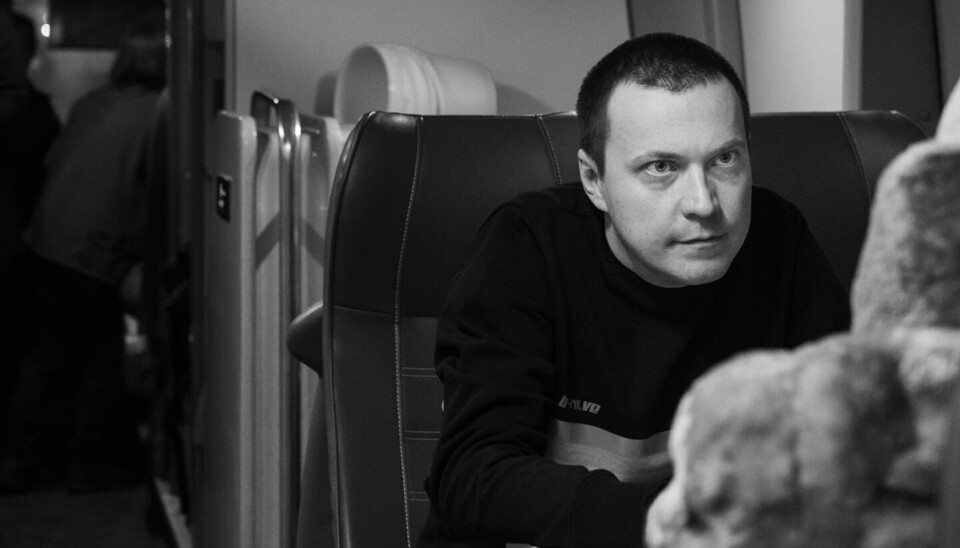
Activists assisting HIV-positive people inside a special bus in Russia
Aleksei Lakhov personal archive
journalist
THE BARENTS OBSERVER
29 November 2024 - 16:33
While the world marks World AIDS Day on 1 December, HIV statistics in Russia look increasingly grim. According to the latest research published in The Lancet, while global HIV morbidity and mortality rates are falling, in Russia they are rising.
For years, experts have described the HIV situation in Russia as an epidemic.
In 2022, the Ministry of Health reported about 887,700 people living with HIV in Russia, while other figures put the number at over 1 million.
According to the Russian authorities, around 59,000 cases of HIV were detected in 2022 alone - 3.9% of the 1.5 million cases worldwide. In May this year, the authorities reported that HIV numbers had fallen by 4.6%. However, experts the Barents Observer spoke to are skeptical of the positive trend of the official statistics.
Why is HIV sweeping the country?
Epidemic
A professional doctor from St. Petersburg, who introduced himself as Maxim, told the Barents Observer that he has to hide his HIV status from his colleagues for fear of being fired from his job. He was diagnosed with HIV at the age of 24 when he lived in the Siberian city of Omsk.
I had a steady sexual partner, we had an open relationship with her. My mistake was that I didn't use condoms. I was a student and condoms were too expensive for me,"
Maxim told the Barents Observer on the phone, adding that he didn't know of any places in town where he could get condoms for free.
"I feel very stressed about having to hide my HIV status now. But if I open up, I will not be able to live and work normally in Russia. I don't want to be treated like an antisocial person".
The negative stigma surrounding HIV is one of the main reasons why HIV numbers are rising in Russia, experts say.
Aleksei Lakhov, a member of the NGO delegation to UNAIDS, says the main reason of the HIV spread in Russia is the lack of effective preventive measures:
Russia has never really had effective prevention measures, such as an adequate supply of sterile needles to drug addicts, and there is still no sex education in schools. Some people in Russia often don't even know how to use a condom,"
says Aleksei, adding that the roots of the problem go back to the rough post-Soviet 1990s:
"In the 1990s there was a heroin epidemic in Russia, and many people got infected through needles. Many also had to work in the sex industry”.
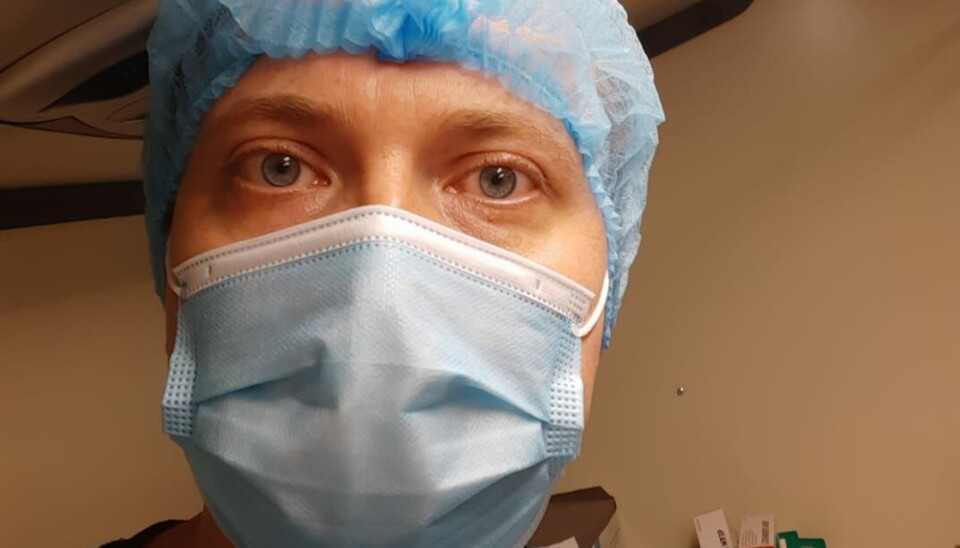
Aleksei Lakhov during his work with HIV-positive people in Russia personal archive
Before moving to Germany a year ago, Aleksei Lakhov had been helping HIV patients in Russia for 10 years. A former drug addict himself, he felt it was his duty to help those still struggling. Working with various NGOs, he spent almost 10 years driving around Russia's provincial towns in a blue bus, handing out needles, testing and educating people about HIV. But instead of full support from the authorities, they were repeatedly accused of "drug propaganda" for handing out needles.
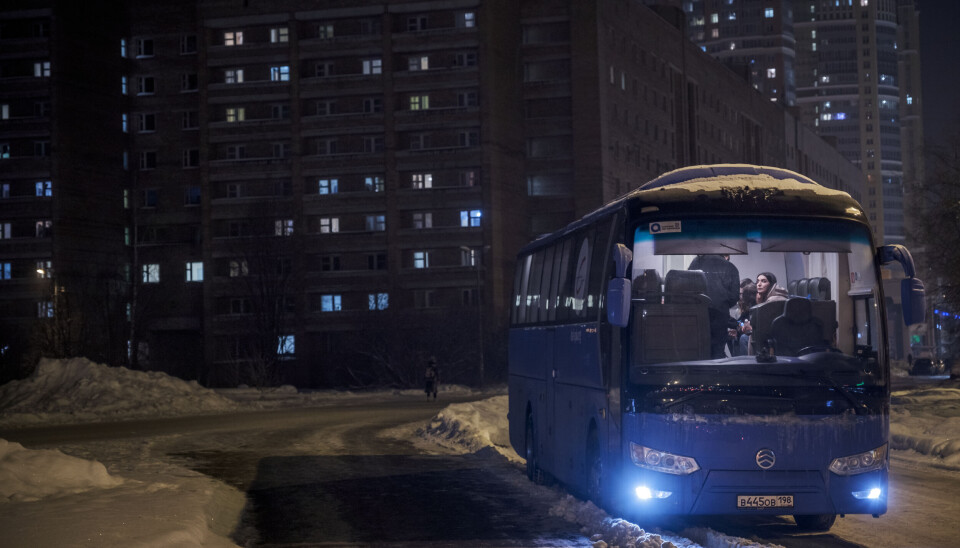
Bus in the St Petersburg suburbs, where activists helped HIV-positive people. Photo: Artyem Leshko
"Some officials don't want to understand that distributing needles is not like a kiosk where you can just come and pick them up," Aleksei Lakhov tells the Barents Observer, "It's a complex job. It involves HIV testing, medical and psychological care, and social support”, Aleksei Lakhov said.
Experts the Barents Observer spoke to stress that targeting the key groups most vulnerable to HIV, such as drug users, men who have sex with men, members of the LGBTQ+ community, sex workers and prisoners, is crucial for effective HIV prevention.
Many Western countries, such as Norway, have long worked closely with these groups.
Outlaw
Meanwhile, following a series of recent draconian laws in Russia, many people from these key groups and support groups for HIV-positive people have had to go underground.
After Russia added the "LGBT movement" to the list of extremists and banned gender reassignment surgery, it has become a crime to share any information about LGBTQ+ related issues.
"Previously, organisations providing support to transgender people, for example, could have open social media groups, advertise themselves and attract new members, - Aleksei Lakhov tells the Barents Observer, - but now they are forced to spread knowledge through the grapevine.
People are afraid that any public online support group could be interpreted as 'sex change propaganda' or something like that. So unfortunately a lot of people are now unaware that there might be a support group in their town. It feels like the 19th century”.
The growing propaganda narrative about so-called 'traditional values' basically excludes any mention of non-traditional sexual relations.
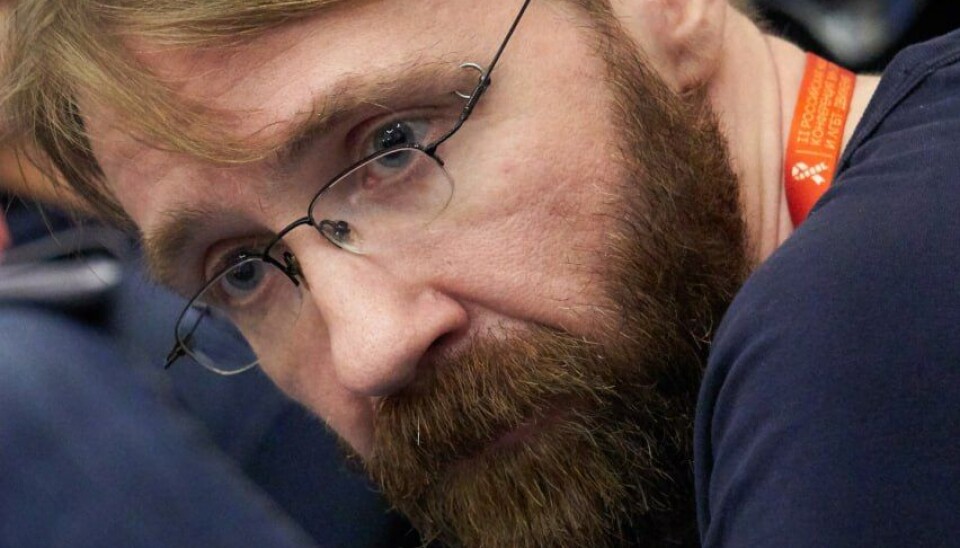
Timofey Sozaev's NGO was labeled as a "foreign agent" personal archive
"I am openly gay and I know the HIV situation in the gay community very well," says Timofey Sozaev, who used to head the NGO "Action", which supported HIV-positive people in Russia. Timofey stresses that distributing condoms is often not enough. An important part of his work was providing psychological support to boost the self-esteem of the most vulnerable groups:
"Some people can take a condom and make a balloon out of it instead. It's because some people in Russia don't feel that their life has any value, that a person has a right to live," Timofey tells the Barents Observer. - "What can you expect when all you hear since childhood is "a good gay in Russia is a dead gay"? You grow up not valuing yourself”. Timofey told the Barents Observer, adding that some people commit suicide because they feel rejected by society.
While the world marks World AIDS Day on 1 December, HIV statistics in Russia look increasingly grim. According to the latest research published in The Lancet, while global HIV morbidity and mortality rates are falling, in Russia they are rising.
For years, experts have described the HIV situation in Russia as an epidemic.
In 2022, the Ministry of Health reported about 887,700 people living with HIV in Russia, while other figures put the number at over 1 million.
According to the Russian authorities, around 59,000 cases of HIV were detected in 2022 alone - 3.9% of the 1.5 million cases worldwide. In May this year, the authorities reported that HIV numbers had fallen by 4.6%. However, experts the Barents Observer spoke to are skeptical of the positive trend of the official statistics.
Why is HIV sweeping the country?
Epidemic
A professional doctor from St. Petersburg, who introduced himself as Maxim, told the Barents Observer that he has to hide his HIV status from his colleagues for fear of being fired from his job. He was diagnosed with HIV at the age of 24 when he lived in the Siberian city of Omsk.
I had a steady sexual partner, we had an open relationship with her. My mistake was that I didn't use condoms. I was a student and condoms were too expensive for me,"
Maxim told the Barents Observer on the phone, adding that he didn't know of any places in town where he could get condoms for free.
"I feel very stressed about having to hide my HIV status now. But if I open up, I will not be able to live and work normally in Russia. I don't want to be treated like an antisocial person".
The negative stigma surrounding HIV is one of the main reasons why HIV numbers are rising in Russia, experts say.
Aleksei Lakhov, a member of the NGO delegation to UNAIDS, says the main reason of the HIV spread in Russia is the lack of effective preventive measures:
Russia has never really had effective prevention measures, such as an adequate supply of sterile needles to drug addicts, and there is still no sex education in schools. Some people in Russia often don't even know how to use a condom,"
says Aleksei, adding that the roots of the problem go back to the rough post-Soviet 1990s:
"In the 1990s there was a heroin epidemic in Russia, and many people got infected through needles. Many also had to work in the sex industry”.

Aleksei Lakhov during his work with HIV-positive people in Russia personal archive
Before moving to Germany a year ago, Aleksei Lakhov had been helping HIV patients in Russia for 10 years. A former drug addict himself, he felt it was his duty to help those still struggling. Working with various NGOs, he spent almost 10 years driving around Russia's provincial towns in a blue bus, handing out needles, testing and educating people about HIV. But instead of full support from the authorities, they were repeatedly accused of "drug propaganda" for handing out needles.

Bus in the St Petersburg suburbs, where activists helped HIV-positive people. Photo: Artyem Leshko
"Some officials don't want to understand that distributing needles is not like a kiosk where you can just come and pick them up," Aleksei Lakhov tells the Barents Observer, "It's a complex job. It involves HIV testing, medical and psychological care, and social support”, Aleksei Lakhov said.
Experts the Barents Observer spoke to stress that targeting the key groups most vulnerable to HIV, such as drug users, men who have sex with men, members of the LGBTQ+ community, sex workers and prisoners, is crucial for effective HIV prevention.
Many Western countries, such as Norway, have long worked closely with these groups.
Outlaw
Meanwhile, following a series of recent draconian laws in Russia, many people from these key groups and support groups for HIV-positive people have had to go underground.
After Russia added the "LGBT movement" to the list of extremists and banned gender reassignment surgery, it has become a crime to share any information about LGBTQ+ related issues.
"Previously, organisations providing support to transgender people, for example, could have open social media groups, advertise themselves and attract new members, - Aleksei Lakhov tells the Barents Observer, - but now they are forced to spread knowledge through the grapevine.
People are afraid that any public online support group could be interpreted as 'sex change propaganda' or something like that. So unfortunately a lot of people are now unaware that there might be a support group in their town. It feels like the 19th century”.
The growing propaganda narrative about so-called 'traditional values' basically excludes any mention of non-traditional sexual relations.

Timofey Sozaev's NGO was labeled as a "foreign agent" personal archive
"I am openly gay and I know the HIV situation in the gay community very well," says Timofey Sozaev, who used to head the NGO "Action", which supported HIV-positive people in Russia. Timofey stresses that distributing condoms is often not enough. An important part of his work was providing psychological support to boost the self-esteem of the most vulnerable groups:
"Some people can take a condom and make a balloon out of it instead. It's because some people in Russia don't feel that their life has any value, that a person has a right to live," Timofey tells the Barents Observer. - "What can you expect when all you hear since childhood is "a good gay in Russia is a dead gay"? You grow up not valuing yourself”. Timofey told the Barents Observer, adding that some people commit suicide because they feel rejected by society.
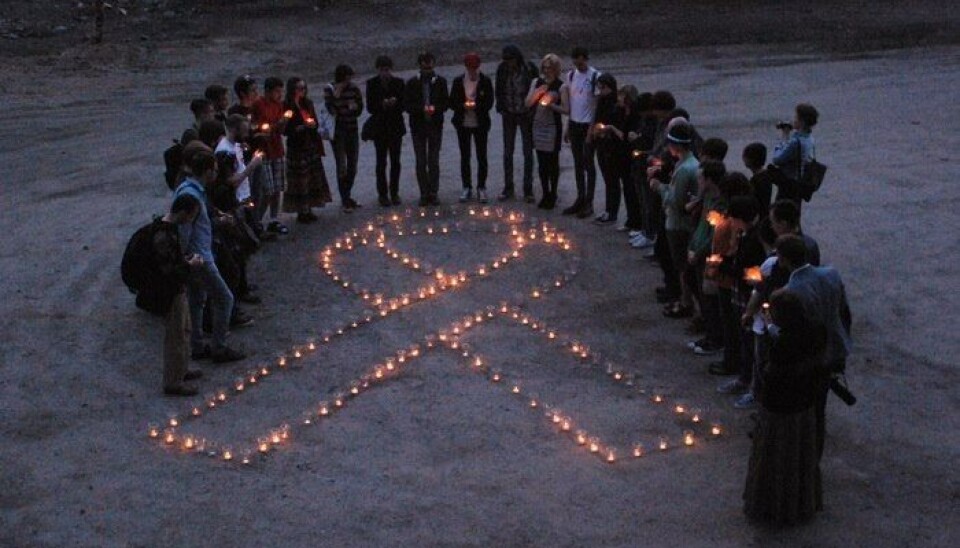
Gathering in memory for those who died of AIDS in Russia Photo: Timofey Sozaev
Timofey stressed that sex workers are also "not treated like human beings" by Russian authorities, forcing them to go underground where their HIV status remains undetected.
Leaving Russia
Timofey was forced to close the NGO "Action" in 2019, after the organisation was labelled a "foreign agent". He is now in the US, where he has applied for political asylum. He calls the "traditional values" narrative pushed by Russian state propaganda "fake":
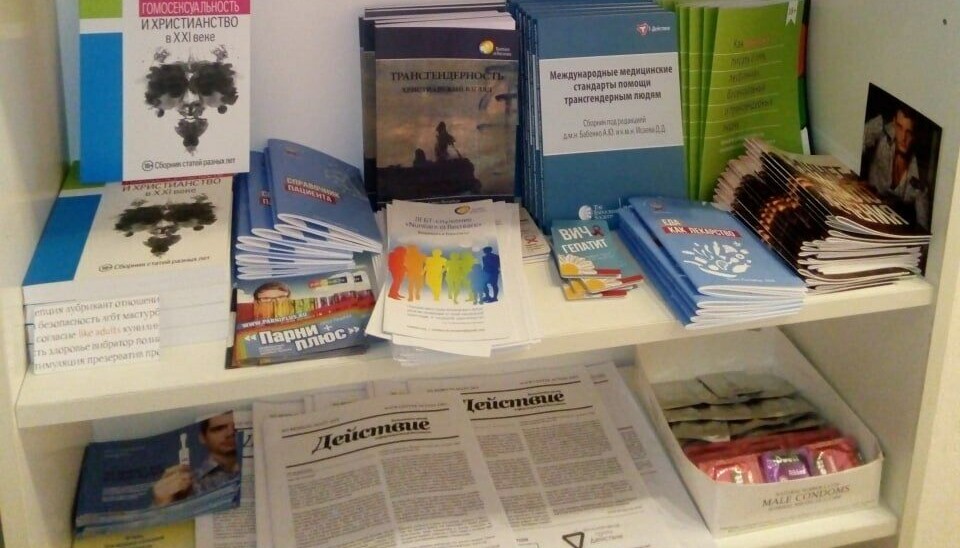
Shelves in the office of the "Action" with condoms and information about HIV Photo: Timofey Sozaev
"Instead of sex education in schools, they push the fake 'traditional values', but if you don't educate young people properly, it leads to the spread of HIV," says Timofey.
Médecins Sans Frontières (MSF) is another organisation that has been involved in HIV-related work, but was recently forced to leave Russia.
In Moscow and St Petersburg, MSF had two "mobile stations" - buses where anyone could pick up a clean needle, get tested and receive all the necessary information about HIV treatment and how it is transmitted.
Norman Sitali, MSF's medical director, told the Barents Observer that migrants in Russia were one of the main groups using the "mobile stations" service:
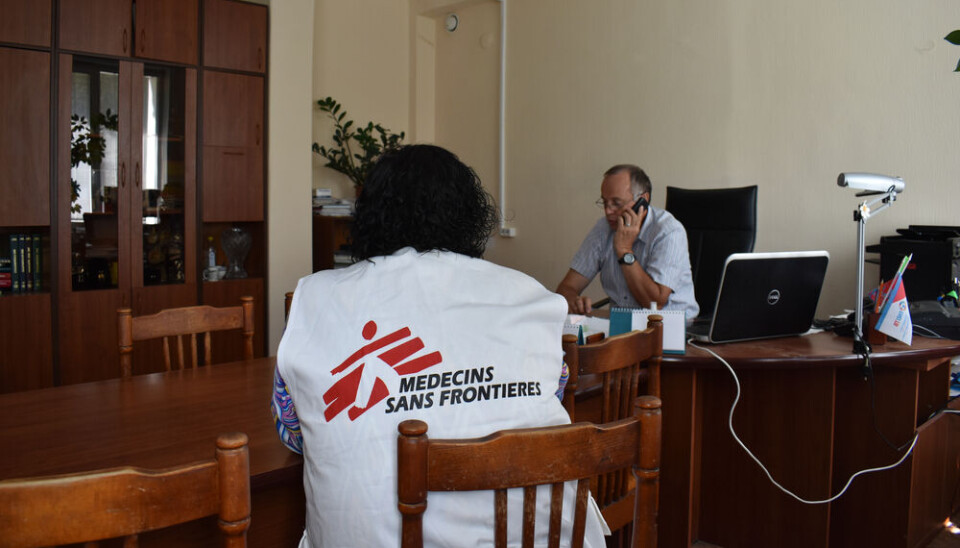
MSF had been working with HIV-related issues in Russia for many years until it was forced out photo: msf.org, Alexandra Sadokova
"If you are a migrant who has come to Russia, the risk of being deported because you have HIV is very high," Norman Sitali tells the Barents Observer. - "That's why you don't want to go to state institutions where you will be exposed. Our aim was to help everyone, not to discriminate and not to identify anyone.”
According to Sitali, the lack of effective prevention among key populations accounts for up to 50 per cent of HIV transmissions. According to Sitali, this is a problem not only in Russia, but also in other parts of the world where the HIV epidemic is very high - North Africa, Eastern Europe and Central Asia.
Access to drugs
In Russia, every HIV patient registered in the health system is entitled to free antiretroviral treatment. But in 2023, serious problems were reported with the supply, as Russia imports the drugs from all over Europe, the UK and the US.
Maxim, who works as a doctor in St Petersburg and hides his HIV status, tells the Barents Observer that he is still registered with the Siberian city of Omsk health system and receives antiretroviral treatment with pills from the US pharmaceutical company MSD.
After Russia's full-scale invasion of Ukraine, MSD issued a statement saying that it would continue to supply Russia:
“We are saddened by the invasion of Ukraine and we continue to stand united with the Ukrainian people. We hope for an urgent and peaceful resolution, and our paramount concerns are the safety and well-being of our employees and ensuring our patients and customers have continued access to medicines and vaccines needed for patient and public health. For humanitarian reasons, MSD has a responsibility to continue supplying essential medicines and vaccines in Russia.”
In the current unpredictable geopolitical climate, HIV-positive people in Russia are worried. Also worrying is the rising price of Western drugs as the rouble plummets. In Russia, where more and more money is needed for war, the health sector is losing funding.
According to Maxim, an increasing number of HIV-positive people in his close circle are now being switched by the Russian health system from Western drugs to Russian-made drugs, which are of inferior quality:
"The American MSD is just one pill that I take every morning. But with the Russian analogue called Elpida, which hasn't even been tested internationally, you have to take three pills. You also have to take it before bed, which often affects your sleep, and you have to follow a special diet. It's not easy," Maxim tells the Barents Observer, adding that he hopes drug imports to Russia will continue.


No comments:
Post a Comment